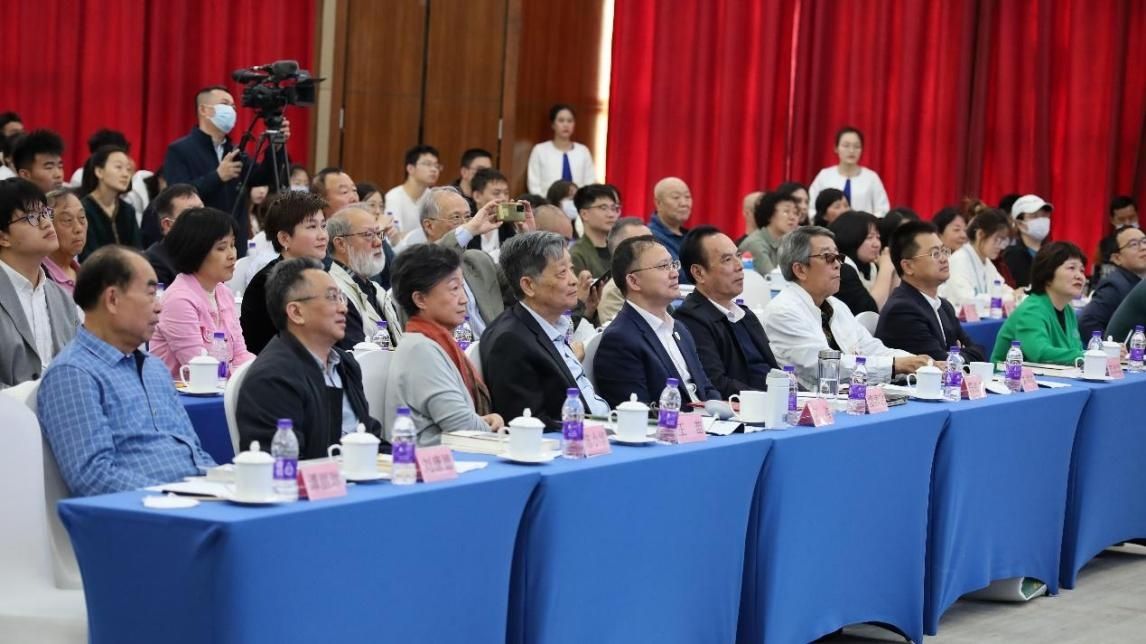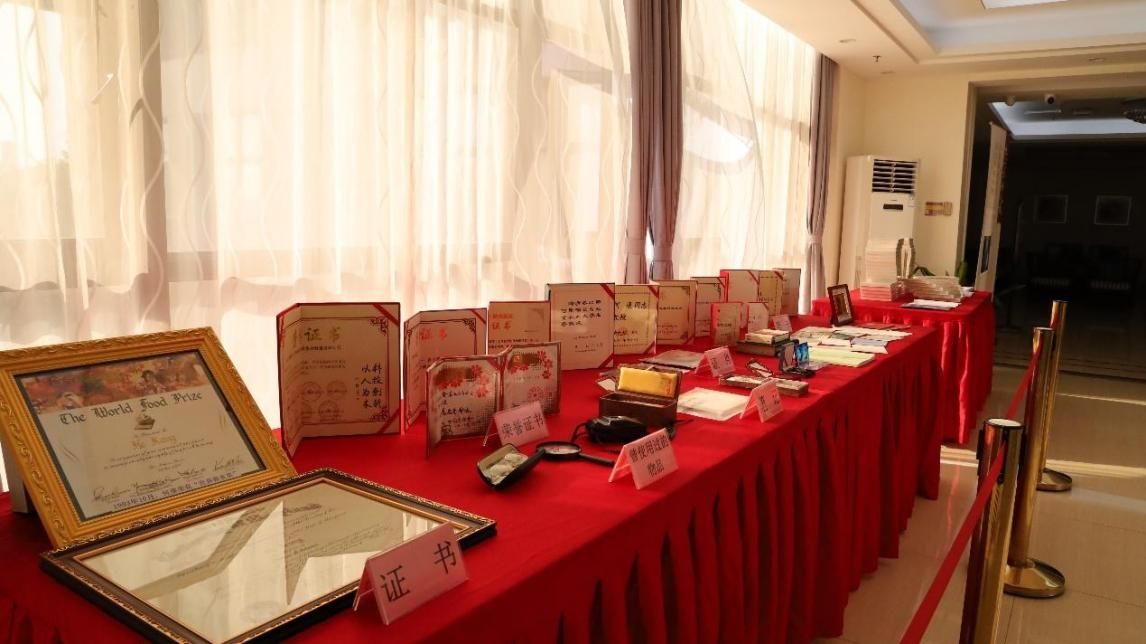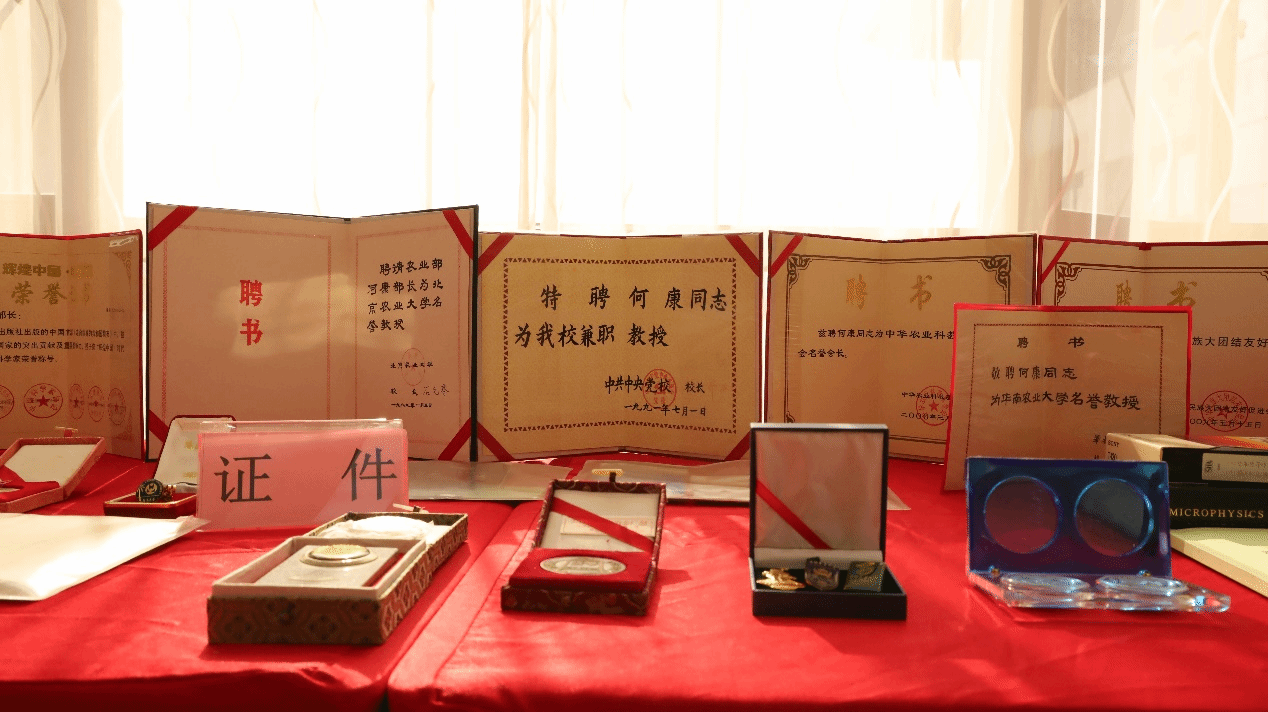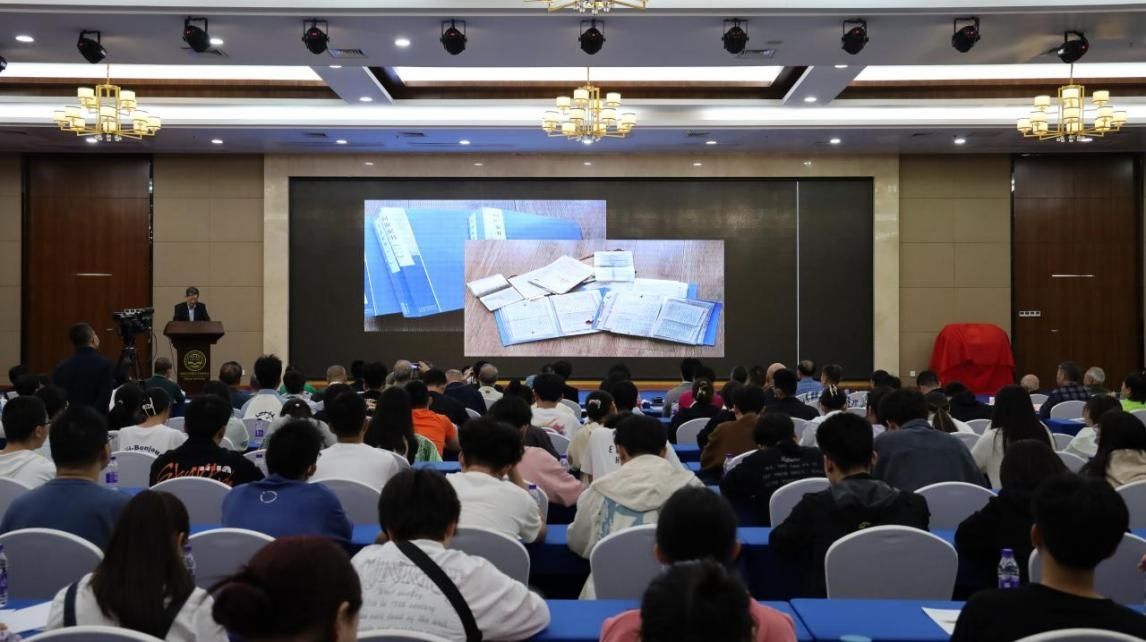From February 22 to 23, 2023, Hainan University held a series of events in honor of late former President He Kang, the first president of the former South China University of Tropical Agriculture (now Hainan University), founder of China’s natural rubber industry, and former Minister of Agriculture.

(The Interment of ashes ceremony)
Addressing the interment of ashes ceremony held at Hainan Tropical Botanical Garden on Danzhou Campus on February 23, Fu Xuanguo, Party Secretary of the University, said: “The best commemoration, deepest remembrance and highest salute we can pay to our late President He is to take him as a role model, carrying forward the spirits and patriotism of previous revolutionaries and builders represented by He, and, as mentioned by his eldest son, Mr. He Di, in his book Give My Heart to the People, being a person of noble character and morals, a person free from low tastes and beneficial to the people.”
On the day earlier, on February 22, the donation ceremony of late President He's relics and the book launch of Give My Heart to the People, a collection of letters between President He and his wife, were held at the International Academic Exchange Center of the University. Chen Haibo, former Deputy Director of the Standing Committee of the Hainan Provincial People's Congress, Zhu Hansong, former Deputy Director of the Publicity Department of CPC Hainan Provincial Committee, and Chen Xiaohua, Deputy Director of the Publicity Department of CPC Hainan Provincial Committee were present at the event. Professor Luo Qingming, President of Hainan University and academician of the Chinese Academy of Sciences, awarded the donation certificate to Mr. He.
Pioneer in introducing and planting natural rubber trees between 18 and 24 degrees north latitude
At the donation ceremony, Mr. He, the eldest son of the late president, donated to the University 79 pieces of his father’s relics, including reading notes, thesis notes, one diary, two letters, the certificate of the World Food Prize, one application form for He Kang Agricultural Education Scholarship, the appointment letter of honorary professor of Beijing Agricultural University, and the certificate of honorary doctorate from the University of Maryland.
Mr. He said, “Among nearly a hundred diaries, I choose this one to donate to the University, because it recorded the founding history of the former South China University of Tropical Agriculture”, showing a yellowed diary of President He from 1958, which took faculty and students attending the ceremony back to the days of He and other founding members, known as “pioneers in thatched huts”.
Back to the 1950s, rubber was an essential strategic reserve resource, and establishing China’s own natural rubber base was a top priority and that’s why President He was appointed as the Director-General of the Special Forestry Department of the former Ministry of Forestry and State Farms in June 1952. Just a few days later, he hurriedly went on a three-month field trip southward to Guangdong, Yunnan, Guangxi, and Hainan Island.
Later, President He and his family of four relocated from Beijing to Guangzhou and then to Hainan Island in 1958 in order to develop the rubber industry.
“At that time, the former South China Agricultural College set up many branches, but only the Hainan branch, started with grass huts, survived. In 1959, the College was renamed as the South China University of Tropical Agriculture, which is known as Hainan University now,” Mr. He recalls those early days when he moved to Hainan with his father in his tender age, but his memory of the hardships was still fresh.
From those thatched huts built on overgrown wastelands and barren hills, President He and his colleagues, through unremitting efforts, finally succeeded in introducing and planting natural rubber in large areas between 18 and 24 degrees north latitude in China, breaking the Encyclopedia Britannica's assertion that rubber trees can only grow in limited tropical areas — about 10 degrees north and south of the equator.
However, they soon faced another difficulty — rubber tapping — due to Hainan’s tropical location, dense rubber forest, sultry weather, countless mosquitoes and limited tapping time (usually in the early morning with proper temperature and sufficient moisture forming root pressure). To solve this problem, they designed a set of headlamps with batteries for rubber tappers to work in the dark.

(The donation ceremony and the book launch)
Founder of a namesake agricultural education scholarship fund that have helped 3,000 students
“The combination of research, education and production was my father’s consistent advocacy. He hoped that ‘wherever there are tropical crops, there will be our alumni’, which has become a reality now,” said Mr. He when donating two pieces of letters related to students from nearly 200 letters of his father.
President He served as the Minister of Agriculture from 1988 to 1990. He deeply knew what this means in a large agricultural country like China and did not dare to have the slightest slack. He once said that food security was the most worrying to him no matter when and where he was.
In 1993, President He was awarded the 7th World Food Prize by the World Food Foundation in recognition of his outstanding contribution to China's agricultural development, making him the first Chinese to receive the prize. Yet he chose to donate the entire $200,000 prize money to the China Agricultural Science and Education Foundation, which was and still is used to reward agricultural research projects and students with excellent character and academic performance in agricultural colleges and universities.
“The salary the country pays me is already high enough. And the World Food Prize is something I got on behalf of my country, not something that belongs to me personally. That’s why I want to donate all the $200,000 to the country to help talented impoverished students, who need financial support to further their study, so this money can cultivate a group of competent personnel in agricultural science and technology for our country. It is my duty to do something for the country,” President He once said. Today, the He Kang Agricultural Education Scholarship has awarded and helped nearly 3,000 students.
Mr. He also donated the certificate of the World Food Prize and an application form of He Kang Agricultural Education Scholarship submitted in 2003 by Cai Xueqin, a student of South China University of Tropical Agriculture.
“My father kept three scholarship application forms, one of which was submitted by Cai Xueqin 20 years ago. Reading her application form, one will be both poignant and inspired by her constant self-improvement and hard work. What a promising student!” he said.

(Relics of late former President He Kang)

(Relics of late former President He Kang)
An inspiration for generations to come
At the book launch, Mr. He introduced his book Give My Heart to the People: A Collection of Family Letters from He Kang's Hainan Years, which discloses nearly two hundred letters between President He and his wife for the first time, presenting vivid details of his legendary life as the founder of China’s natural rubber industry.

(The donation ceremony and the book launch)
The book presents the most difficult but also the best years in the life of President He from different angles. The simple words in the letter are still eloquent and touching today.
Chen Runbiao, a junior student majoring in land resource management from the School of Public Administration, said “We are deeply touched and inspired by President He’s story of moving from Beijing to Guangzhou and then to Danzhou to develop China’s rubber industry from scratch.”
“It’s the mission of every HNU student to carry forward this kind of selfless dedication, hard work, ceaseless self-improvement and bold innovation in this southern frontier, to strive for excellence and serve the motherland in one heart and one mind,” said Fang Jing, a third-year ecology major from Danxin College.
Special guests such as Tan Xueshu, Chairman of the Agricultural and Rural Committee of Liuzhou Municipal People's Congress; Liu Kangde, former secretary of CPC HNU Committee, and some other retired leaders and faculty members of the University; Tan Lilin, Chief Editor of Hainan Publishing House; Gao Diangong, Han Shumei, and Tan Yong, members of the Standing Committee of CPC HNU Committee, as well as representatives from relevant functional departments, schools, and colleges of the University also attended these events.
(Source: HNU News)